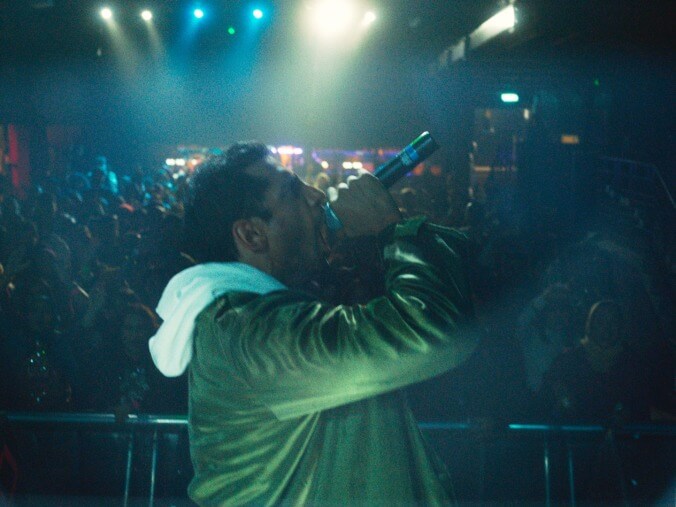Riz Ahmed is a rapper battling illness in the surreal, slight Mogul Mowgli
The Sound Of Metal comparisons are unavoidable, but Mogul Mowgli stakes out far different territory

In Sound Of Metal, Riz Ahmed played a heavy metal drummer contending with sudden hearing loss, a role that netted him an Oscar nomination. In Ahmed’s latest film, Mogul Mowgli, he plays a British-Pakistani rapper who is diagnosed with a degenerative autoimmune disease while visiting his family in London. Comparisons of the two films are unavoidable: Along with the similar premise and shared lead actor, they’re both narrative features from directors who cut their teeth in the documentary world. Still, it’s a shame this new movie will likely reside in the shadow of Sound Of Metal, since it stakes ground far removed from Darius Marder’s dual-portrait of addiction and disability. In Mogul, director Bassam Tariq and Ahmed, who also co-wrote the script, craft a psychedelic vision of an identity crisis in which inherited diasporic trauma manifests in physical illness. It’s a movie about the way that existential distress afflicts the mind and the body alike.
Ahmed’s character, Zaheer, is a typical first-generation immigrant who found his voice in Western music, mainly hip-hop and jungle, and remains on the outside of his Pakistani family’s culture after moving to America. Though he politely participates in traditions and gatherings, it’s clear he distanced himself from his parents’ working-class life a long time ago. Despite passively severing ties to his history, he mines his cultural roots for socially conscious lyrics and proudly boasts about his heritage on stage. Neither Tariq nor Ahmed judge Zaheer too harshly for his choices, which are all too common for immigrant children. When Zaheer’s cousin lambasts him for going by “Zed” on stage and with his friends, he justifiably defends himself: It’s a nickname no different than “Bob” or “Dave,” and insisting people identify him by his given name would’t be some profound anti-Western position. The flip side is that Zaheer has actually forgotten his parents’ struggles to give him the name he’s willfully changed. His focus is entirely on his music career, which is about to blow up as he embarks on an upcoming European tour.
Yet Zaheer’s plans are cut short when he lands in the hospital after his muscles start to rapidly, mysteriously deteriorate. Following a series of tests, his doctor recommends an experimental stem cell treatment that might help him manage the disease but also render him permanently infertile. Zaheer’s father, Bashir (Alyy Khan), strongly opposes this idea and tries to sway Zaheer to alternative treatments that might preserve the family lineage. The realities of the young man’s diagnosis are difficult: While re-learning to walk in physical therapy, he learns that a rival rapper (Nabhaan Rizwan) plans to replace him on tour. And with these struggles come the ghosts of his family’s past.
Zaheer’s entire sense of self fractures at the moment when he tries to pull himself together. The hospital becomes a venue for his subconscious to run amok, leading to imagined concerts and freestyle battles, as well as flashbacks to his childhood working in his father’s scrappy restaurant that take a gradual turn for the nightmarish. Sound designer Paul Davies interrupts the action with rumbling train tracks and haunting laughter. Meanwhile, a mysterious man in a flower veil taunts Zaheer, calling himself “Toba Tek Singh,” a reference to Saadat Hasan Manto’s satire about an asylum inmate caught between India and Pakistan in the wake of Partition. Some of these hallucinatory dream sequences are more obvious than others. Take, for example, Zaheer swallowing a microphone to express his refusal to cede the spotlight.
Tariq and Ahmed characterize Zaheer’s family in specific terms, whether it’s how they communicate in a mixture of English and Urdu or the religious rituals in the home or even the tenor of their arguments; all feel ripped from lived experience. Mogul Mowgli doesn’t over-explain that Zaheer’s family lives with the trauma of Partition every day, their shared character shaped by both forced and willful emigration, their lives built upon a permanently unstable foundation that the relative safety of London cannot fix. The filmmakers deserve credit, too, for abstracting a standard coming-of-age, generations-collide immigrant story into the realm of surrealism. They recognize that experimental cinematic grammar can effectively reach the truth of an outsider’s experience, which often feels divorced from reality.
Unfortunately, Mogul Mowgli relies heavily on easy metaphors and makes little effort to disguise its subtext. A doctor tells Zaheer that his body “can’t recognize itself, so it’s attacking itself”—a line that might as well be accompanied by a flashing red light, to further cue the audience that a theme is being expressed. Elsewhere, Zaheer’s ex-girlfriend (Aiysha Hart) attacks him for using his family’s name for his music without ever visiting them, explicitly stating something that was already very clear. Beyond that, Tariq and Ahmed jam too much material into just 89 minutes. At its core, Mogul Mowgli is a story about a father who has passed on his repressed emotional trauma to his son, who has in turn channelled it into music. But this central relationship takes a back seat to Zaheer’s physical deterioration, his rap career, his dark visions. The final scene strains too hard to make up for lost ground; its catharsis is unearned.
Still, Ahmed keeps Mogul Mowgli grounded even when it veers off track. He has a physical and emotional vulnerability, but also an amiable swagger and a down-to-earth quality. He can be effortlessly comedic when Zaheer fights with his manager or heartbreakingly childlike when he interacts with his parents. He never hits the same emotional note twice, even when the script asks for just one thing from him. He remains unpredictable and approachable at almost any given moment, which lends Mogul Mowgli an edge it would otherwise lack. Ahmed can’t sand over all of the flaws through sheer charisma. But with him at center, the movie is always watchable, even in its imperfections.